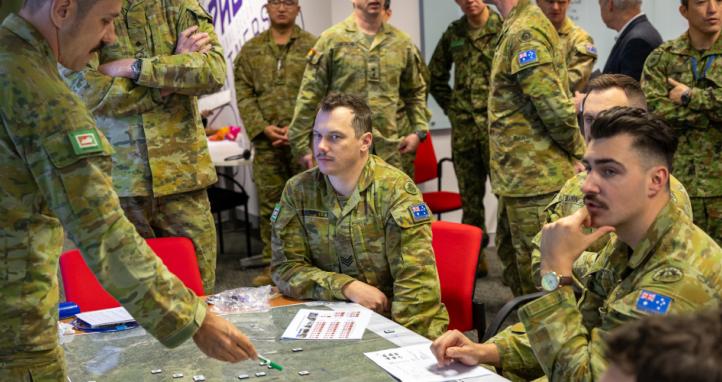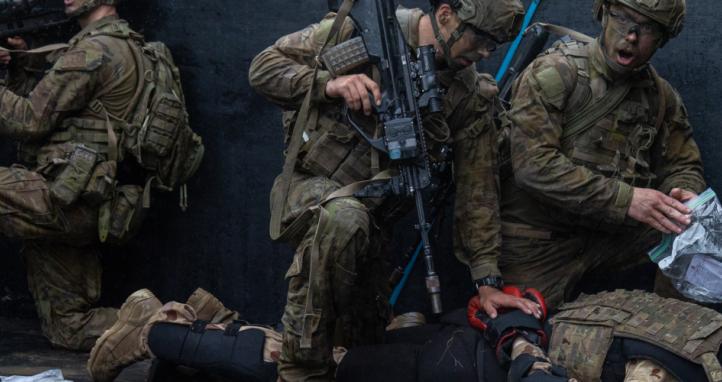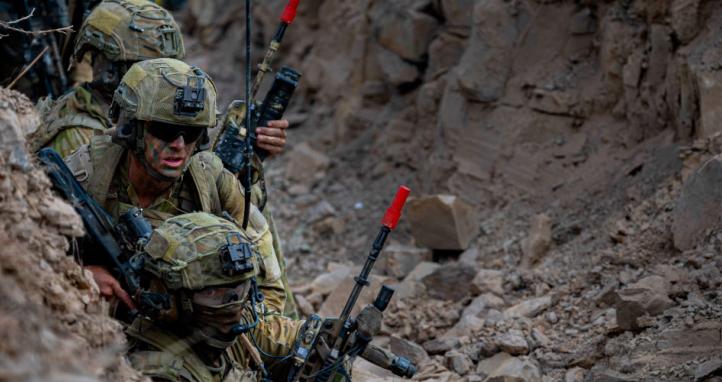Facts and figures
| Government type | Presidential Republic |
| Notable people |
|
The 'Know Your Region' series is designed to support unit and individual professional military education on the South East Asian region. It's important for all serving members of our military to have a foundational knowledge of the countries and issues in the Indo-Pacific.
The Cove is also privileged to share with you a unique interview opportunity with Natalie Sambhi, a pHD scholar at the ANU Strategic and Defence Studies Centre in Canberra, focusing on Indonesian military history.
INDONESIA – DIPLOMACY
On this page:
- Overview
- Government and Politics
- Foreign Policy and Diplomacy
- Balancing China and the U.S.
- International Forums
Overview
The Indonesian Archipelago's strategic sea-lane position fostered inter-island and international trade, including with Indian kingdoms and Chinese dynasties, under which local kingdoms flourished from the 7th century onwards. Trade has ever since fundamentally shaped Indonesian history. The Hindu Majapahit kingdom was founded in eastern Java by the late 13th century and under Gaja Mada its influence stretched over much of present-day Indonesia in a ‘Golden Age’. Sunni traders and Sufi scholars brought Islam to the archipelago, spreading over three centuries. For the most part, Islam overlaid and mixed with existing cultural and religious influences, shaping the predominant form of Islam in Indonesia, particularly in Java.
In 1602, a century after the first Europeans arrived in the archipelago, the Dutch East India Company (VOC) became the dominant European power for 350 years. The VOC became bankrupt and dissolved in 1799 and the Netherlands took hold of the Dutch East Indies as a nationalised colony. For most of the colonial period, Dutch control over the archipelago was tenuous, with military forces continuously engaged in quelling rebellions. Only in the early 20th century did Dutch dominance extend to what was to become Indonesia's current borders. The Japanese invasion and subsequent occupation during World War II ended Dutch rule and encouraged the previously suppressed independence movement. Days after the surrender of Japan on 17 August 1945, two influential nationalist leaders – Sukarno and Mohammad Hatta – proclaimed Indonesian independence and were appointed President and Vice-President respectively. The Netherlands attempted to re-establish their rule and a bitter armed and diplomatic conflict ended four years later when the Dutch formally transferred sovereignty under mounting international pressure. Despite extraordinary political, social, and sectarian divisions, Indonesians found unity in their fight for independence.
A period of sometimes unruly parliamentary democracy ended in 1957 when President Sukarno declared martial law and instituted ‘Guided Democracy’. After an attempted coup in 1965 by alleged communist sympathisers, Sukarno was eased from his position following a drawn-out power play with Major General Suharto. In March 1967, Suharto was appointed President and ruled Indonesia with his 'New Order' administration. Backing by the United States and the encouragement of foreign direct investment were two crucial factors in the subsequent three decades of substantial economic growth. After street protests toppled Suharto in 1998, legislative elections took place in 1999, and the country's first direct presidential election was in 2004. Indonesia is now the world's third most populous democracy and the economy has experience steady growth in the last 15 years. However, there are ongoing issues, including: political, economic and social instability, corruption, and instances of terrorism (the deadliest being the 2002 Bali bombings). Although relations among the diverse population are mostly harmonious, acute sectarian discontent and violence remain a problem in some areas.
For more information on Indonesian diplomacy, see the following resources:
- Videos
- Podcasts
- History of Southeast Asia | Episode 115: A New Beginning for Indonesia
- History of Southeast Asia | Episode 60: The Indonesian War of Independence
- In-depth Creative | Indonesia's 21-year Transition to Democracy
- In-depth Creative | Maritime As A Source Of Power?
- B.S. History | The Creation of Modern Day Indonesia
- Articles
Government and Politics
The Republic of Indonesia (Republik Indonesia) has a presidential system. The President of Indonesia is the Head of State and Head of Government, Commander-in-Chief of the Indonesian National Armed Forces, and the Director of domestic governance, policy-making, and foreign affairs. The President may serve a maximum of two consecutive five-year terms. The highest representative body at the national level is the People's Consultative Assembly or Majelis Permusyawaratan Rakyat (MPR). The MPR comprises of two houses: the People's Representative Council (Dewan Perwakilan Rakyat, DPR) with 575 members and the Regional Representative Council (Dewan Perwakilan Daerah, DPD) with 136. Operating with a civil law system based on the Roman-Dutch model and influenced by customary law. The highest courts are the Supreme Court (Mahkamah Agung) and the Constitutional Court (Mahkamah Konstitusi).
Since 1999, Indonesia has had a multi-party system with no political party winning an overall majority of seats. The Indonesian Democratic Party of Struggle (PDI-P), which secured the most votes in the April 2019 elections, is the party of the incumbent president, Joko Widodo. Dubbed 'Jokowi', he is the 7th President of Indonesia and the first not to come from an elite political or military background. As President, Jokowi has primarily focused on infrastructure, introducing or restarting long-delayed programs to improve connectivity in the Indonesian archipelago. Other notable parties include the Party of the Functional Groups (Golkar), the Great Indonesia Movement Party (Gerindra), the Democratic Party, and the Prosperous Justice Party (PKS). This is Widodo's second and final term with the next elections to be held in 2024.
Indonesia has 34 provinces (provinsi), of which five have special status. Following the fall of the New Order in 1998, political and governmental structures have undergone sweeping reforms with four constitutional amendments revamping the executive, legislative, and judicial branches. Chief among them is the delegation of power and authority to various regional entities while remaining a unitary state. The five provinces with special status are: Aceh, Yogyakarta Special Region, Papua, West Papua, and the Jakarta Special Capital Region. Another shift was the decentralisation of regencies and municipalities beginning on 01 January 2001, now the key administrative units responsible for providing most government services. These moves have helped Jakarta balance the limited independence of key groups while keeping Indonesia unified.
For more information on Indonesian government and politics, see the following resources:
- Videos
- Bloomberg Markets and Finance | A Conversation with Indonesian President Joko Widodo
- CNA: Insight | Is Jokowi still on track to achieve "Vision Indonesia 2045"?
- ANU TV | The complexity of government: Indonesia
- Financial Times | Indonesia election explained
- ABC News In-depth | Foreign Correspondent - Inside Indonesia's Secret War for West Papua (Warning: graphic content)
- TEDx Talks | Ideological Divides and the Source of Indonesia's Political Stability: Kevin Evans at TEDxJakSel
- Podcasts
- Indonesia Talks | Ella Prihatini - Women Legislators
- Indonesia In-depth | Solving the Indonesian Political Rubik's Cube
- Lowy Institute | Quick comment: Eve Warburton on Jokowi and Indonesian politics
- Global Questions | IN-DEPTH: How is Islam changing Indonesian politics? W/ Dr Rachel Rinaldo and Dr Dina Afrianty
- La Trobe Asia | #156: Islam and Indonesian Politics
- Contain This: The Latest in Global Health Security | Community preparedness and response in Indonesia - Eka Wulan Cahyasari, Indonesian Red Cross
- Talking Indonesia | Hipolitus Wangge - Papua and Special Autonomy
- Articles
- The Diplomat | Indonesian Soliders Killed During Papuan Separatist Raid
- CFR | Indonesia's Election: Southeast Asia's Drifting Heavyweight
- Lowy Institute: The Interpreter | Indonesia: painted politics
- The Diplomat | How Does Jokowi See Indonesia in the Post-Pandemic World?
- The Jakarta Post | Papua needs more than junior diplomacy
Foreign Policy and Diplomacy
Indonesia is considered a rising middle power in global affairs and influential in the region. The archipelago maintains 132 diplomatic missions abroad, including 95 embassies. The country adheres to what it calls a ‘free and active’ foreign policy, seeking a role in regional affairs in proportion to its size and location but avoiding involvement in conflicts among other countries. The Ministry of Foreign Affairs of the Republic of Indonesia’s (MoFA) mission is to advance eight foreign policy points, ranging from the promotion of maritime diplomacy and strong borders to protecting Indonesian citizens abroad.
USA and USSR contested for influence over Indonesia during the Cold War. Numerous attempts by the United States and the Soviet Union – along with the People's Republic of China to some degree – culminated in the 1965 coup attempt and subsequent upheaval that re-oriented the archipelago’s geopolitical posture. Quiet alignment with the Western world while maintaining a non-aligned stance has characterised Indonesia's foreign policy since then. Jakarta claimed sovereignty over all maritime areas around the archipelago in the Djuanda Declaration 1957. This was a move to bolster the Wawasan Nusantara or Indonesian Archipelagic Vision as a unified state of political, economic, social, cultural, defence and security entity. This national insight informs Indonesia's perspective on geopolitics and strategic goals, such as their maritime outlook.
A period of strain on Indonesia's relations with the international community were a result of its invasion of neighbouring East Timor (now Timor-Leste) in December 1975. The subsequent annexation and occupation for twenty years, the independence referendum in 1999, and the resulting violence afterwards. Indonesia has been a humanitarian and development aid recipient since 1966 and the country established its first overseas aid program in late 2019. The country also managed to play a diplomatic role as a peacemaker in the Cambodia-Thailand conflict over the Preah Vihear temple. The MoFA lists other important diplomatic milestones for the country.
On foreign policy, Jokowi has mandated a three-pronged policy to: maintain Indonesia's sovereignty, enhance the protection of Indonesian citizens, and intensifying economic diplomacy. President Jokowi aspires for the country to become a global maritime power (poros maritim dunia). Asserting that Indonesia must present itself as a force between the two oceans – the Indian Ocean and the Pacific Ocean – to safeguard the maritime country's future.
For more information on Indonesian foreign policy and diplomacy, see the following resources:
- Videos
- South China Morning Post | Dutch King apologises to former colony Indonesia for mass killings during independence war
- Asia Society | Republic of Indonesia: Minister for Foreign Affairs Retno Marsudi
- Indonesia In-depth | Is Islam a Decisive Factor in Indonesian Foreign Policy Making? with Sidney Jones
- James Ker-Lindsay | EAST TIMOR - The Difficult Road from Occupation to Independence
- Podcasts
- Indonesia Talks | Dr Lis Kramer & Ele Williams - Indonesia Australia Public Diplomacy
- Lowy Institute | Indonesia's foreign policy: In conversation with Dewi Fortuna Anwar
- Foreign Policy Talks | EP #38 Recent Developments and Challenges in the EU-Indonesia Relationship
- Foreign Policy Talks | EP #29 Indonesia-Denmark Bilateral Relationship in the Post COVID-19 World
- Foreign Policy Talks | EP#56 The Role of Social Media on Indonesia's Foreign Policy
- Articles
- The Mainichi | Global Perspective: Indonesia's 3 challenges in becoming a Southeast Asian Power
- Aspenia Online | Indonesia: Southeast Asia's Once and Future Regional Power
- The Jakarta Post | The archipelagic-state concept a quid pro quo
- Radio Free Asia | More Than 80 Percent of Indonesia's Vaccine Supply Comes From China
- ASPI | Indonesia's 'free and active' foreign policy on show in ministerial visits to Japan and China
Balancing the US and China
The United States has important economic, commercial, and security interests in Indonesia. It remains a lynchpin of regional security due to its strategic location astride a number of key international maritime straits, particularly the Malacca Strait. Relations between Indonesia and the US are positive and have advanced since the election of President Yudhoyono in October 2004. The US played a role in Indonesian Independence in the late 1940s and appreciated Indonesia's role as an anti-communist bulwark during the Cold War. Cooperative relations are maintained today, yet no formal security treaties bind the two countries. Washington and Jakarta share the common goal of maintaining peace and stability in the region and engaging in a dialogue on threats to regional security. Cooperation on counter-terrorism has increased steadily since 2002, as terrorist attacks in Bali (October 2002 and October 2005), Jakarta (August 2003 and September 2004), and other regional locations demonstrated the presence of terrorist organisations in the archipelago.
China and Indonesia established diplomatic relations in 1950 but various forms of relations between the countries have been ongoing for centuries. Despite this long history, the diplomatic relationship between the two states was suspended in 1967. A consequence of the failed communist coup in 1965, then the fall of Sukarno and rise of Suharto in the same year. Maintaining that Communist China was partly responsible for the attempted coup and wary of their continued influence, Jakarta severed diplomatic ties. It was not until 1990 that relations were normalised and restored in talks between Premier Li Peng and President Suharto. The basis of the bilateral relationship would be on the Five Principles of Peaceful Co-Existence and later the Ten Principles of the Bandung Conference. Beijing and Jakarta have grown closer with deep economic and trade connections. Indonesia is only minorly threatened by the territorial disputes in the South China Sea, particularly in the Natuna Islands where China's nine-dash line intercepts Indonesian Economic Exclusion Zone claims. President Jokowi has stated that, 'there will be no compromise on sovereignty' and renamed Indonesia's maritime section as the 'North Natuna Sea'.
For more information on Indonesia’s diplomatic relationship with China and the US, see the following resources:
- Videos
- WION | Gravitas: Stand-off in South China sea: Indonesia's stern message to China
- CNBC International TV | Indonesia minister on trade relations with Australia and China
- PBS NewsHour | China's vaccine faces scrutiny as Indonesians die despite shots, U.S. pledges donations
- CGTN | Wang Yi holds talks with Indonesian envoy
- Podcasts
- Indonesia Talks | Emirza Adi Syailendra - China's Rise
- Foreign Policy Talks | EP #34 Assessing the Indonesia-China Relationship
- Indonesia Talks | Dr Taomo Zhou - China, Indonesia and the Cold War
- Foreign Policy Talks | EP #55 Indonesia, China and the Belt and Road Initiatives (BRI)
- Indonesia Talks | Dr Dino Patti Djalal - US-Indonesia Relations
- Foreign Policy Talks | EP #30 The Future of U.S.- Indonesia Relationship under Biden's Presidency
- Articles
- Friedrich Ebert Stiftung - Asia | Indonesia's Global Maritime Fulcrum & China's Belt Road Initiative: A match made at sea?
- The ASEAN Post | Indonesia's Global Maritime Hub In The Making?
- In-depth Creative | Why Indonesia won't comment on Xinjiang
- The Jakarta Post | Harris' trip a 'strategic signaling' to Indonesia, ASEAN?
- Nikkei Asia | Jokowi vows 'no compromise' on Natuna standoff with China
International Forums
Indonesia is a member of several multilateral organisations, including the United Nations, World Trade Organisation and G20. Also, a founding member of the Non-Aligned Movement (NAM), Association of Southeast Asian Nations (ASEAN), East Asia Summit, and the Organisation of Islamic Cooperation (OIC). Jakarta is signatory to several international agreements on climate change including the Kyoto Protocol and Paris Agreement. Alongside some specific ones including the Comprehensive Nuclear Test Ban and Hazardous Wastes.
During the Indonesia-Malaysia confrontation (1963-1966), Jakarta withdrew from the United Nations due to the latter's election to the UN Security Council, although it returned 18 months later. It marked the first time in UN history that a member state had attempted a withdrawal. Currently, Indonesia still has strained relations with a few of its neighbours, mostly fuelled by disputes over land and maritime territory. The remaining unsettled disputes are with Malaysia, Australia, China and Taiwan. Indonesia also entered a trilateral cooperation agreement with Malaysia and the Philippines, allowing coordinated patrols in the pirate-infested Sulu Sea. For more information on the war between Jakarta and Kuala Lumpur watch the following video.
As one of the founding members of ASEAN and the largest country in Southeast Asia, Indonesia regards the regional forum as the cornerstone of its foreign policy and multilateral outlook. Indonesia's capital Jakarta is also home to ASEAN’s Secretariat and Headquarters which has led to the prominence of the city as a diplomatic hub. Through this forum Jakarta promotes cooperation, development, democracy, security, peace, and stability in the region. President Jokowi has released an 'Indo-Pacific Vision' for ASEAN countries, which calls for regional architecture and considers the Indian and Pacific Oceans as a single interconnected geostrategic area. After the transformation from Suharto's insular regime to a relatively open and democratic country in the 21st century, Indonesia exercises its rising influence through its leadership in ASEAN.
For more information on Indonesia’s involvement in international forums, see the following articles:
- Articles
Discussion Questions:
- Indonesia is one of the most multicultural nations in the world, with a diversity of races and ethnicities spanning the large archipelago. Despite having experienced conflicts among various groups, it maintains a very strong semblance of national unity. How does Indonesia manage to maintain this? What lessons could be learned by other democratic nations with regards to national cohesion?
- Indonesia and Australia have maintained cordial relations but have never truly been close allies. Should the two nations do more to improve relationships? What mutual threats and opportunities might be leveraged in order to support this?
- Indonesia is seeking to increase its influence within the region, yet one of its main foreign policy points is to not interfere in other nations issues. Can Indonesia become an influential regional power without becoming involved in regional issues? Would other regional nations welcome Indonesian input to internal matters?
- The rising presence of China in seas claimed by Indonesia has caused significant tension between the two nations, with Indonesia making moves to increase military presence in its northern waters. Can Indonesia unilaterally manage any issues it has with China, or will it call on regional nations to provide support? What sort of support will they seek? How will Australia be involved in this?
Know your region
Know Your Region series gives you a shortcut to understanding other nations in the Indo-Pacific region.









